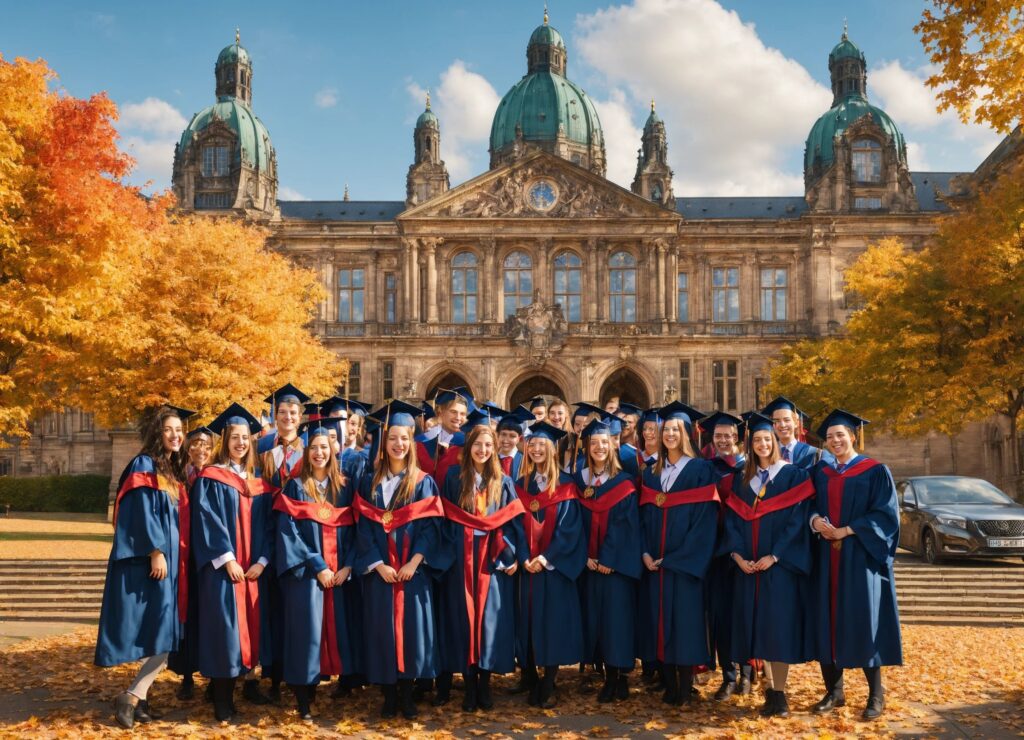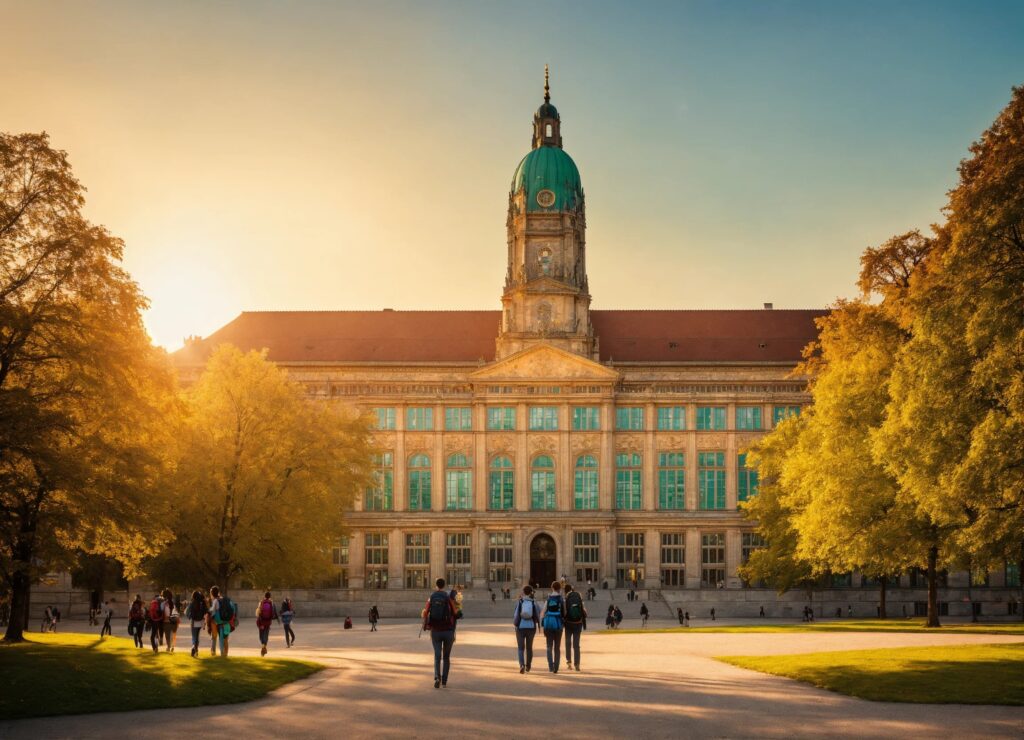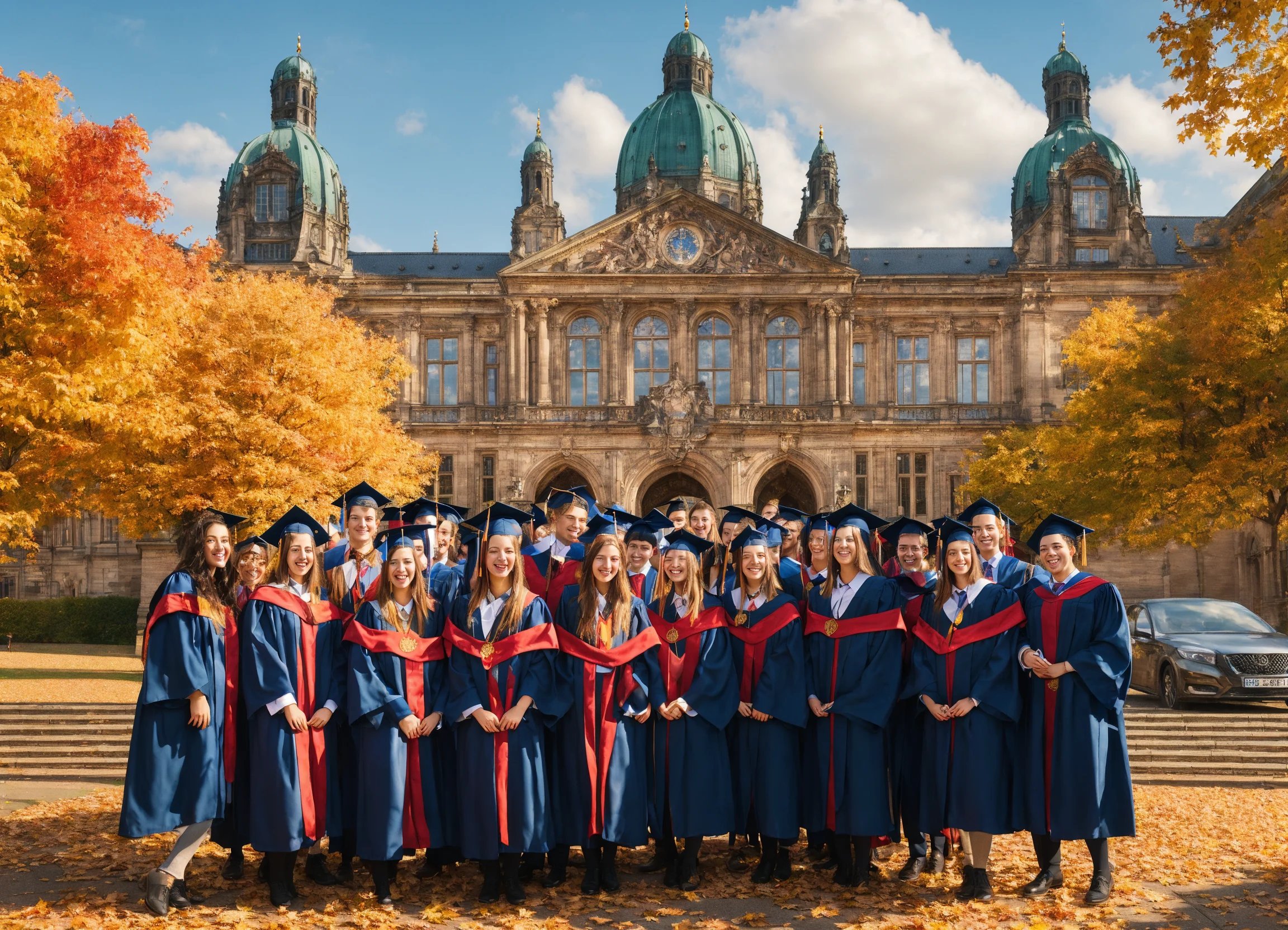In the global landscape of higher education, Germany stands as a formidable force, offering a unique blend of academic rigor, cultural diversity, and a commitment to innovation. The country’s educational ethos, deeply rooted in a history of intellectual achievements and groundbreaking research, has propelled its universities to the forefront of international acclaim.
One of the key factors that set Germany apart as an educational hub is its commitment to providing top-notch education without the financial strain often associated with quality learning. A distinct advantage that beckons students from around the world is the availability of tuition-free education at many esteemed institutions.
As we embark on this exploration, it becomes evident that Germany isn’t merely a destination for academic pursuits but an immersive experience that enriches both the mind and soul. In this section, we delve into the multifaceted appeal of studying in Germany, uncovering the advantages that make it a compelling choice for those seeking an affordable yet high-caliber education. From the picturesque landscapes that frame university campuses to the dynamic cultural milieu, Germany offers a holistic environment for intellectual and personal growth. Join us as we unravel the facets that make studying in Germany an enriching journey, opening doors to a world-class education and a life-changing experience.
Nestled in the heart of Europe, Germany has emerged as a beacon of academic excellence, drawing students worldwide into its rich tapestry of higher education. Beyond its medieval castles and modern urban landscapes, Germany’s universities stand as pillars of intellectual achievement, seamlessly blending tradition with cutting-edge research and innovation.
What distinguishes Germany as a preferred destination for aspiring scholars is its commitment to making education accessible. Many of its universities offer tuition-free programs, breaking down financial barriers and making quality education available to a global audience. This unique aspect positions Germany as a frontrunner in providing an equitable and inclusive educational experience.
As we embark on this exploration, we unravel the multifaceted appeal of studying in Germany. The allure extends beyond the lecture halls, encompassing a vibrant cultural scene, a strong emphasis on research, and a welcoming environment that encourages collaboration and critical thinking. Students find themselves immersed not only in the academic rigors but also in a society that values diversity and fosters personal growth.
Join us as we navigate the educational landscape of Germany, exploring not just the merits of its academic programs but also the broader canvas of cultural experiences and opportunities for personal and professional development. This is an invitation to discover why Germany has become a magnet for those seeking not just an education but a transformative journey.

Let’s delve into more detail about the first five universities in Germany:
- Technical University of Munich (TUM):
- Overview: TUM is renowned for its emphasis on technology, engineering, and natural sciences. It consistently ranks among the top universities globally.
- Strengths: Offers a broad spectrum of programs in engineering, computer science, physics, and management. Known for cutting-edge research and strong industry connections.
- Campus Life: The university’s main campus is in Munich, providing a vibrant and culturally rich environment. TUM fosters an entrepreneurial spirit and encourages students to engage in practical projects.
- Ludwig Maximilian University of Munich (LMU Munich):
- Overview: LMU Munich is one of Europe’s leading research universities, offering a diverse range of disciplines.
- Strengths: Strong faculties in humanities, social sciences, and natural sciences. Emphasis on interdisciplinary research and international collaboration.
- Research Excellence: LMU Munich has a distinguished record of research output, contributing significantly to advancements in various fields.
- University of Heidelberg:
- Overview: As Germany’s oldest university, Heidelberg has a rich history and is a key player in international research and academic exchange.
- Strengths: Offers a comprehensive range of programs across various disciplines, with a particular focus on research-intensive programs.
- Campus Atmosphere: Located in the picturesque city of Heidelberg, the university provides a unique blend of academic excellence and a vibrant cultural setting.
- University of Freiburg:
- Overview: Known for its commitment to high-quality teaching and research, the University of Freiburg is a hub for innovation.
- Strengths: Strong programs in environmental sciences, life sciences, and humanities. Promotes interdisciplinary approaches to problem-solving.
- Sustainability Focus: The university actively engages in sustainability research and initiatives, reflecting its commitment to addressing global challenges.
- Humboldt University of Berlin:
- Overview: Humboldt University is characterized by its research-led teaching and commitment to fostering critical thinking.
- Strengths: Strong faculties in arts and humanities, social sciences, and natural sciences. Emphasizes internationalization and collaboration.
- Cultural Hub: Located in Berlin, the university offers students not only a top-notch education but also exposure to a vibrant cultural scene and historical significance.
- RWTH Aachen University:
- Overview: Renowned for its focus on engineering and technology, RWTH Aachen is one of Germany’s premier technical universities.
- Strengths: Offers programs in mechanical engineering, computer science, physics, and more. Strong emphasis on practical experience through internships and collaborations with industry partners.
- Research Impact: The university is at the forefront of cutting-edge research, particularly in engineering and technology-related fields.
- University of Mannheim:
- Overview: The University of Mannheim is recognized for its excellence in business and economics education.
- Strengths: Offers a range of social sciences and humanities programs. Renowned for its business school, which consistently ranks among the top in Europe.
- International Perspective: Emphasizes an international outlook, fostering a diverse and multicultural campus environment.
- University of Stuttgart:
- Overview: With a strong focus on engineering and natural sciences, the University of Stuttgart is a key player in technological advancements.
- Strengths: Known for research in sustainable technologies. Offers programs in various engineering disciplines, computer science, and natural sciences.
- Innovation Hub: Located in a region known for its technological innovation, the university collaborates closely with industry partners and research institutions.
- Technical University of Berlin:
- Overview: TUB is known for its diverse programs in engineering, natural sciences, and humanities, emphasizing practical experience.
- Strengths: Promotes internationalization and collaboration. Students benefit from practical projects, internships, and a dynamic urban environment in Berlin.
- Urban Campus: Situated in the heart of Berlin, the university provides a unique blend of academic excellence and exposure to one of Europe’s most dynamic cities.
- University of Hamburg:
- Overview: The University of Hamburg is recognized for its diverse academic offerings and commitment to research.
- Strengths: Offers strong programs in social sciences, life sciences, and humanities. The university actively participates in interdisciplinary research initiatives.
- Research Excellence: Known for its research output, the university contributes significantly to advancements in various academic disciplines.
Certainly! Let’s continue exploring the last set of universities from 10 to 15:
- Goethe University Frankfurt:
- Overview: Goethe University in Frankfurt emphasizes interdisciplinary research and teaching, positioning itself as a hub for academic collaboration.
- Strengths: Strong programs in finance, economics, social sciences, and humanities. Known for its international research networks and contributions.
- Global Perspective: The university attracts students seeking a global perspective, with an emphasis on diverse academic approaches.
- University of Cologne:
- Overview: The University of Cologne is known for its research contributions and comprehensive range of programs.
- Strengths: Offers programs in arts, humanities, social sciences, and natural sciences. Renowned for its research centers and strong emphasis on interdisciplinary studies.
- Cultural Heritage: Situated in the historic city of Cologne, the university provides a rich cultural backdrop to academic pursuits.
- **University of Leipzig: **
- Overview: As one of Germany’s oldest universities, the University of Leipzig boasts a storied history and a commitment to academic excellence.
- *Strengths: * Offers programs in various disciplines, including arts, life sciences, and social sciences. Known for its research output and vibrant student life.
- *Historical Significance: * The university’s legacy adds to the cultural and academic richness of Leipzig.
- Dresden University of Technology (TU Dresden):
- Overview: TU Dresden is known for its excellence in engineering, natural sciences, and technology-related programs.
- Strengths: Offers a range of engineering disciplines, computer science, and physics. Emphasizes internationalization and research collaboration.
- Innovation Hub: Located in Dresden, a city known for its cultural heritage and technological innovation.
- University of Bonn:
- Overview: The University of Bonn places a strong emphasis on research and innovation, contributing significantly to global advancements.
- Strengths: Offers programs in natural sciences, humanities, and social sciences. Known for its research centers and commitment to sustainability.
- Research Impact: The university actively engages in cutting-edge research, fostering an environment of intellectual curiosity.
- University of Duisburg-Essen:
- Overview: The University of Duisburg-Essen is recognized for its comprehensive academic offerings and commitment to research.
- Strengths: Offers a wide range of programs in engineering, social sciences, and natural sciences. Emphasizes collaboration with industry partners.
- Urban Campus: With campuses in Duisburg and Essen, students benefit from an urban environment that blends academic excellence with cultural experiences.
Let’s explore some of the courses offered by the mentioned universities:
- Technical University of Munich (TUM):
- Course: Master’s in Electrical Engineering and Information Technology.
- Description: TUM’s program covers advanced topics in electrical engineering, communication systems, and information technology, preparing students for leading roles in technology-driven industries.
- Ludwig Maximilian University of Munich (LMU Munich):
- Course: Master’s in International Business Administration.
- Description: LMU Munich’s program focuses on global business strategies, international markets, and cross-cultural management, providing students with a comprehensive understanding of the global business landscape.
- University of Heidelberg:
- Course: Master’s in Molecular Biosciences.
- Description: Heidelberg’s program explores molecular biology, biochemistry, and biophysics, fostering advanced research skills and preparing students for careers in life sciences.
- University of Freiburg:
- Course: Master’s in Environmental Governance.
- Description: Freiburg’s program addresses environmental challenges, combining governance, policy analysis, and sustainability studies to prepare students for roles in environmental management and policy.
- Humboldt University of Berlin:
- Course: Master’s in Comparative European Politics.
- Description: Humboldt’s program examines political systems in Europe, emphasizing comparative analysis and providing students with insights into the complexities of European politics.
- RWTH Aachen University:
- Course: Master’s in Mechanical Engineering.
- Description: RWTH Aachen’s program focuses on advanced mechanical engineering principles, including robotics, materials science, and thermodynamics, preparing students for roles in the mechanical industry.
- University of Mannheim:
- Course: Master’s in Business Informatics.
- Description: Mannheim’s program combines business and information technology, equipping students with the skills to bridge the gap between business needs and technological solutions.
- University of Stuttgart:
- Course: Master’s in Sustainable Energy Engineering.
- Description: Stuttgart’s program explores sustainable energy technologies, renewable energy systems, and energy management, preparing students for careers in the evolving field of sustainable energy.
- Technical University of Berlin:
- Course: Master’s in Urban Planning.
- Description: TUB’s program focuses on urban development, spatial planning, and sustainable city design, equipping students with the knowledge to address the challenges of urbanization.
- University of Hamburg:
- Course: Master’s in International Environmental Law.
- Description: Hamburg’s program delves into international legal frameworks concerning environmental protection, providing students with expertise to navigate complex environmental issues globally.

Let’s explore additional courses offered by the remaining universities:
- Goethe University Frankfurt:
- Course: Master’s in Finance.
- Description: Frankfurt’s program focuses on financial markets, investment strategies, and risk management, providing students with the skills required for careers in finance and banking.
- University of Cologne:
- Course: Master’s in Cultural Studies.
- Description: Cologne’s program explores cultural phenomena, media studies, and interdisciplinary approaches, offering students a deep understanding of cultural dynamics in a global context.
- University of Leipzig:
- Course: Master’s in Global Studies.
- Description: Leipzig’s program examines global challenges, international relations, and intercultural communication, preparing students for roles in international organizations and diplomacy.
- Dresden University of Technology (TU Dresden):
- Course: Master’s in Computational Engineering.
- Description: TU Dresden’s program integrates computer science with engineering, focusing on numerical simulations and advanced computing techniques for solving engineering problems.
- University of Bonn:
- Course: Master’s in Plant Biotechnology.
- Description: Bonn’s program explores advanced topics in plant genetics, biotechnology, and crop improvement, preparing students for research and innovation in the field of plant sciences.

Bonus:
- University of Duisburg-Essen:
- Course: Master’s in Mechanical Engineering and Robotics.
- Description: Duisburg-Essen’s program combines mechanical engineering with robotics, providing students with expertise in designing and implementing robotic systems for various applications.
- University of Stuttgart:
- Course: Master’s in Aerospace Engineering.
- Description: Stuttgart’s program focuses on aircraft and spacecraft design, aerodynamics, and propulsion systems, preparing students for careers in the aerospace industry.
- Technical University of Berlin:
- Course: Master’s in Data Science.
- Description: TUB’s program addresses data analysis, machine learning, and data-driven decision-making, preparing students for roles in the rapidly evolving field of data science.
- University of Hamburg:
- Course: Master’s in Marine Biology.
- Description: Hamburg’s program explores marine ecosystems, biodiversity, and conservation, preparing students for research and management roles in marine science.
- University of Bonn:
- Course: Master’s in Economics.
- Description: Bonn’s program covers advanced economic theories, quantitative methods, and policy analysis, equipping students with analytical skills for careers in economics and finance.
These courses showcase the diverse and specialized offerings of these universities, spanning a wide range of disciplines and catering to the evolving demands of various industries.

